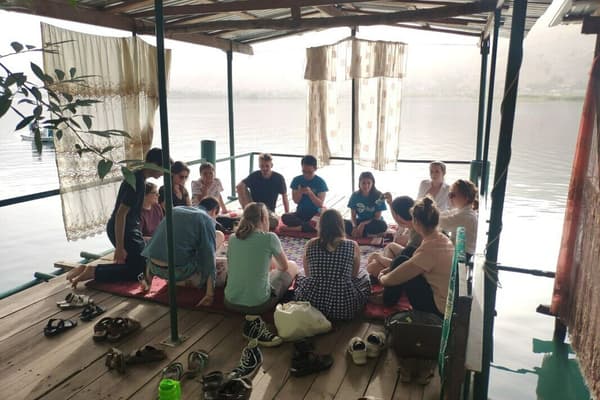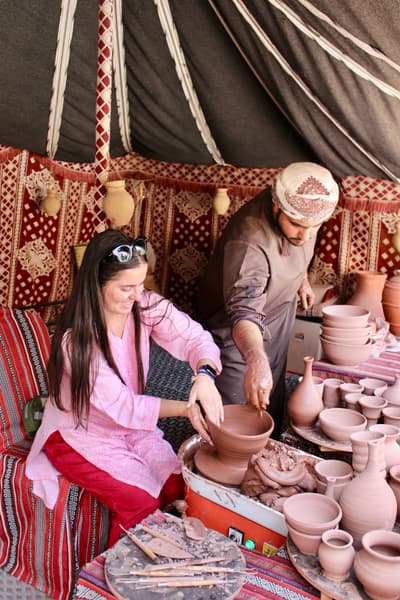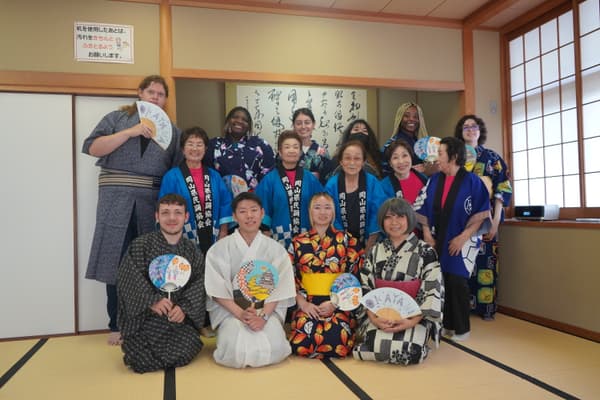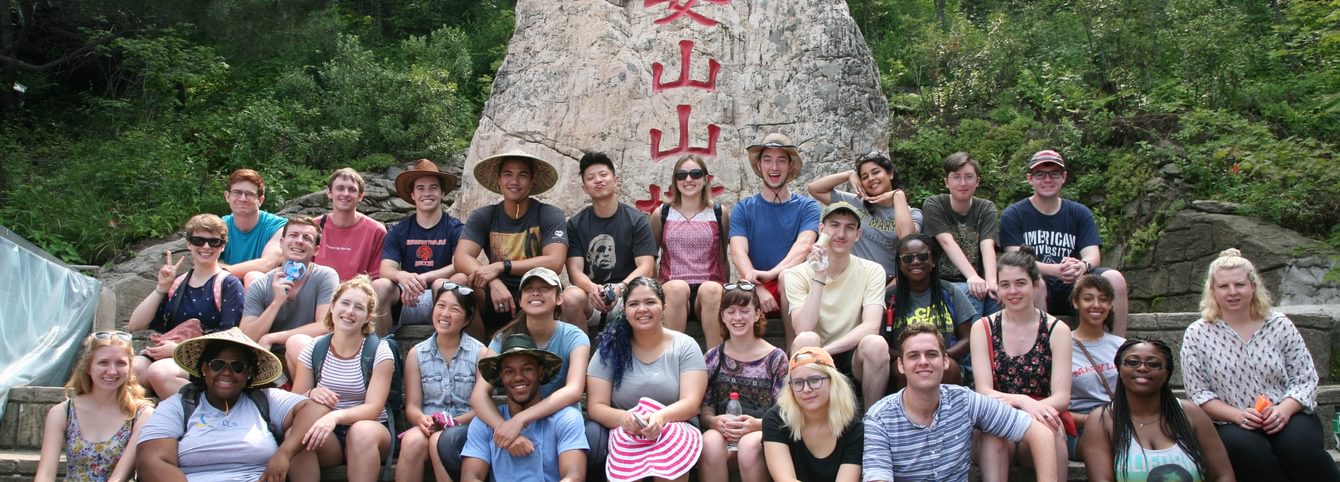Maintaining Your Identity Abroad
As finalists research the politics, attitudes, beliefs, and values of people in the host community, different opinions may emerge around a wide array of topics, including regarding race, religion, gender, sexual orientation, and other aspects of identity. These differences in perspective and understanding of local and world history as well as contemporary society often reflect the different historical and contemporary experiences of people in the host community. Learning about these topics from a new viewpoint can be eye-opening. It can, at times, however, feel prejudiced, discriminatory, offensive, or even threatening.
Your Safety
CLS students should always prioritize their safety, including when discussing sensitive or personal topics, particularly with people who are unfamiliar or when approaching topics that have not previously been discussed with a particular interlocutor. However, students are encouraged to have conversations around a large number of issues with members of their host community, as this can be a rare opportunity to gain first-hand insight into important topics. We recommend the following tips when pursuing conversations of interest and of a sensitive nature:
- Refrain from discussing sensitive subjects, including politics, religion, gender norms, and sexual identity, until you get to know your conversation partner(s) better. Begin by speaking in general, rather than personal, terms to measure the potential responses of the person you are speaking with.
- Seek to understand the local context, including the history of various identity groups in your host community, key legislation that impacts these groups, and common cultural norms.
- Speak with your Resident Director or other CLS peers who are familiar with the host country or location to develop a strategy for discussing sensitive topics. CLS alumni can be an excellent resource for guidance on approaching such conversations.
- Be aware of your surroundings, and immediately remove yourself from a situation if it feels uncomfortable or something seems strange.
- If you encounter someone who is being aggressively offensive, the best course of action is to ignore them and move away quickly.
- Contact your Resident Director immediately if you need assistance.
Participants can find additional information and advice regarding health and safety abroad in the Health and Safety section of this guide.
American Diversity & Racial Stereotypes
CLS students themselves come from a diverse array of backgrounds. It is a benefit to program participants to learn from peers whom they may not have had the opportunity to meet in other circumstances. It is also a benefit to the host community to learn about the diverse communities that make up the unique fabric of the United States. Participants may encounter any number of different reactions from members of the host community – from complete apathy and disinterest to overwhelming curiosity. These reactions manifest in various ways and are influenced by expectations of what an American “looks like”, as well as the social mores that govern expected behavior towards visitors.
In many countries and locations, expectations about what an “American” looks like, does, or has are heavily influenced by the media. In many cases the assumption is that Americans are white or Caucasian. For CLS participants of color, this can be a unique challenge as host community members may not assume that people of color are American. People from the host community may be less familiar with Americans with Asian, Hispanic or Latin-American, Indigenous, or African heritage, and they may lack knowledge and context when it comes to the acceptable use of language or the history of race in the United States. As a result, they may ask questions or provide commentary that would be considered offensive or discriminatory in the United States.
Not all negative attention is the result of simple misunderstandings, however. Reactions can range from well-intentioned curiosity such as staring or asking unwelcome questions, to expressions of open hostility and interactions that are intended to be insulting or demeaning. Racism exists in many CLS host communities. The social and legal structures that participants are used to may not exist, or the protections that they offer may not extend to foreigners. If a participant encounters a situation that makes them feel unsafe while on the program, it is important that they report it to the Resident Director or institute staff as soon as possible. While it is not possible to control all negative aspects of the host culture and society, the CLS Program and local partners work with members of the local community to build a program where all students can learn safely.
Participants may also find that colorism affects everyday interactions in ways that are surprising. Colorism is a form of discrimination in which individuals or groups with darker skin tone may be treated less favorably or regarded as having lower social status in society in some communities abroad. These attitudes may be reflected in comments about skin complexion, advertisements for products such as skin-lightening creams, and makeup and photo filters meant to create the illusion of lighter skin.
Participants should be prepared to occasionally encounter instances of discomfort due to colorism, bias, and/or racist stereotypes while abroad. However, if attention is overwhelming or feels threatening, participants should always reach out to program staff for support. Previous CLS participants have noted that it can help to contextualize these situations with the experiences of local people from racial or ethnic minority backgrounds in the host country/location.

CLS Persian participants talk during an excursion in Tajikistan.
Sexual Orientation
Participants often find that societal attitudes and perceptions about sexuality and sexual orientation in their host communities differ from attitudes and perceptions in the United States. Laws and legal decisions differ as well. Religious beliefs and observances may also impact attitudes and laws.
We encourage LGBTQ+ participants to be discreet regarding their sexual identity, especially in their first meetings with members of the host community, until participants have had a chance to get to know the person they are interacting with. Participants should also be extremely sensitive about the identities of any friends they make from the host community or those within the CLS cohort who identify as LGBTQ+, as they may be relying on confidentiality.
Local norms and expectations of dating, marriage, spouses, etc. can emerge during conversations with a participant’s host family, roommate(s), or Language Partner(s). All students can benefit from thinking in advance about how they might respond to questions like those listed below, particularly in societies where heterosexuality is assumed:
- “Are you married?”
- “Do you have a boyfriend/girlfriend?”
- “When do you plan to get married?”
- “Do you have children?”
- “When do you have children?”
- “How many children do you hope to have?”
In addition to examining how much they want to share about their own sexual identity, participants should know that many members of CLS host communities may also ask about a participant’s family of origin and assume that the participant has a mother and father. If a participant’s family structure differs from this common expectation, it can be helpful in advance to reflect on how much the participant feels comfortable sharing about their family of origin.
If a participant feels uncomfortable discussing these topics, they can decline to answer, or they can redirect the conversation with a general answer such as “I’m focusing on my studies right now.” If an LGBTQ+ participant has any concerns before, during, or after the CLS Program, they are encouraged to contact CLS Program staff. CLS alumni have volunteered to share their experiences and perspectives with participants as well.
Gender Roles
Participants may find that gender norms abroad are different from what they are used to in their home communities in the U.S. Most commonly this is observed in terms of the roles people hold in public and private spaces, the expectations placed on peoples’ behavior, and the amount of independence deemed appropriate for people of certain genders. In some cases, these roles and expectations can feel heteronormative, restrictive, or discriminatory. However, many CLS students have also reported gaining a more nuanced understanding of gender roles in their communities when they refrain from passing judgement based on their own experiences and observe interactions between and among the genders with a more objective lens. Spending time with host family members, Language Partners, and same-gender members of the host community are great ways to observe gender dynamics. Participants can engage directly in dialogue about traditional gender roles, but should be aware that teachers, Language Partners, or host family members may be uncomfortable discussing the topic.
If a participant experiences anything unsettling or has any questions or concerns about gender roles, they should contact their Resident Director, CLS Program staff or speak to their peers or CLS alumni.

An Arabic participant learns about pottery in Nizwa, Oman.
Heritage Students
Heritage students can experience identity challenges or feel misrepresented in their CLS site. Sometimes, heritage students are identified as a member of the host community because of the way they look or the name they use. This can occasionally be welcome, but at other times may cause confusion or frustration. For many heritage students, the level of comfort they have with the local culture, languages, and traditions is nuanced and based upon their upbringing. Heritage students frequently deal with the expectation that they know much more about their CLS country/location and language than they actually do; they may also find that their background differs from expectations that individuals in the host community or members of their CLS cohort may have of them. It can surprise or frustrate others when a heritage student’s background and experiences do not conform to their expectations of diaspora communities. This, in turn, can feel unsettling or frustrating for the student.
If a member of the host community asks a heritage student questions about their heritage, their family’s heritage, or their immigration history, the student may choose to answer to the degree that they feel comfortable. If the inquiry is posed in a way that makes the student uncomfortable, the student is welcome to redirect the conversation by explaining that they are in the host country/location to study a language. If a participant is concerned about how to navigate their identity as a heritage student in their host community, they should consider reaching out to CLS alumni or talking to CLS Program staff, their Resident Director, and their CLS peers.
CLS Host Institutions
The CLS Program works with its partners to host a diverse range of participants. Teachers and staff are invested in providing support to participants on the CLS Program of all backgrounds. When participants have questions about the host community’s culture, teachers, and staff can often provide valuable insight that helps to explain viewpoints and behaviors.
Even so, it can sometimes be hard for host institution staff to understand the nuances of American culture and the way Americans perceive various aspects of diversity. Although the CLS Program provides regular training and resources to partners, misunderstandings cannot always be resolved through targeted training. Experience plays a key role in learning, and in the same way that participants may experience awkwardness and challenges when learning about their host culture and language—even after years of studying it—CLS hosts are also learning about participants and different aspects of American culture and society. Students should be patient with their host family, roommate(s), Language Partner(s), and other people in the host community who do not share the experiences that participants do.
The CLS Cohort
CLS participants come from diverse backgrounds across the United States and should be prepared for differences in politics, attitudes, beliefs, and values within the CLS cohort itself. Each student brings their own unique set of identities and experiences to the program. Often participants report that the cultural gap between themselves and other Americans on the program was larger than the gap they felt with members of the local community. Students should be sensitive to the experiences of their classmates and acknowledge that their own experiences on program may differ from those of their peers. Participants should also try to maintain an awareness about how status impacts the local community experience and the effect that has on different members of their cohort.

A CLS cohort practices bon odori, a traditional Japanese dance.
Finding Support
Navigating identity in a new environment can be confusing and stressful but also rewarding. All students can benefit from considering how to connect with their support network at home before departure. Students should consider both personal contacts like family and friends, as well as resources at their home universities (like LGBTQ+ centers, support groups, and mental health services). CLS participants can also receive support from people on program as they reflect upon and process their experiences with identity abroad.
The Resident Director
The Resident Director at each program site has significant experience abroad and is connected to many official and informal resources that can support participants through difficult experiences. CLS staff don’t expect that every participant will connect with the Resident Director on a personal level, or feel comfortable discussing deeply personal challenges, but the Resident Director can provide space for students to reflect and process their experience initially. They can also help participants talk through next steps and identify resources that may help.
Any CLS participants who experience discrimination, harassment, or inappropriate behavior should inform their Resident Director as soon as possible. The Resident Director, host institute staff, and CLS staff in the U.S. seek to address inappropriate behavior and create a safe environment for all CLS students.
CLS Peers
In many cases, CLS peers serve as a source of support to one another during the program. Those who have spent more time in the host country or location can be a valuable resource for discussing how to handle complex situations related to identity.
CLS Alumni
Alumni from previous years are available to discuss issues and experiences with identity abroad.
If a participant has trouble connecting with alumni, they may reach out to the CLS Alumni Engagement Officer at clsalumni@americancouncils.org, and CLS staff will do their best to connect the participant with an appropriate alum.
Additional Resources
CLS participants can call ASPE Assist, a 24-hour hotline, at any time while they are abroad to access mental health support and resources. For more information about ASPE Assist, please refer to the Planning for Your Health and Safety section of this guide. Participants are also encouraged to explore the websites described in the Support for Participants section, which contain helpful information for study abroad participants of diverse backgrounds and identities.


